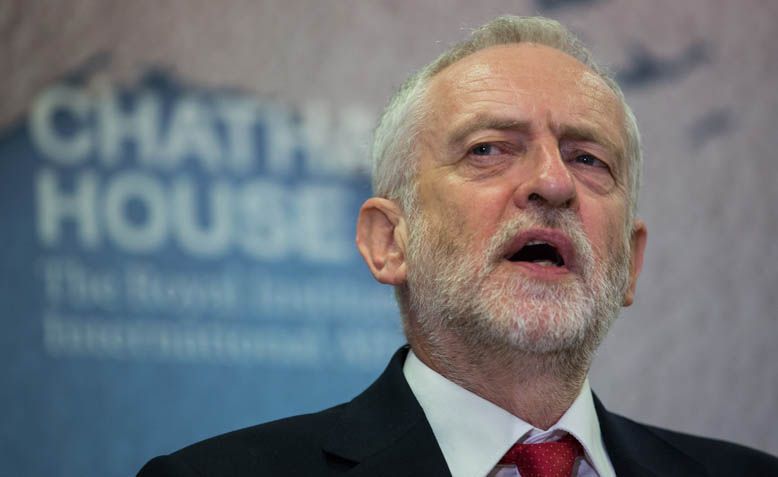 Jeremy Corbyn speaking at Chatham House. Photo: Wikimedia Commons
Jeremy Corbyn speaking at Chatham House. Photo: Wikimedia Commons
British government reaction to the attempted murder of double agent Sergei Skripal is rank hypocrisy, argues Vladimir Unkovski-Korica
The British government today decided to expel 23 Russian diplomats in response to the attempted murder in Salisbury on 4 March of double agent Sergei Skripal with the use of a military grade nerve agent.
The move comes following accusations that Russia either sanctioned the attack or lost control over the nerve agent and thus allowed it into the hands of unscrupulous and criminal elements.
The UK government demanded an explanation from Moscow by midnight on Tuesday, in the absence of which it would conclude the act was “unlawful use of force” by the Russian state against the UK.
Such an ultimatum however could not have been reasonably expected to produce Russian cooperation whether Moscow was behind the attack or not.
Anti-Russian Hysteria
It comes on the back of a breath-taking level of anti-Russian hysteria in the British political, military and media establishment in recent years.
It is of course true that Russia is an imperialist state run by a former KGB officer that has projected its power abroad in illegal and destructive ways in Eastern Europe and the Middle East.
But is Britain not also an imperialist state run by a ruthless elite which has projected its power in illegal and destructive ways in Eastern Europe and the Middle East at the same time?
NATO expansion
Britain is in fact part of NATO, a far more powerful imperialist bloc than Russia. Aggressive NATO expansion in the 1990s and 2000s, and NATO’s illegal “Kosovo War” against Yugoslavia in 1999 in particular, helped push Russia in the direction of authoritarian government under Putin in the 2000s.
Successive Russian governments had watched the expansion of NATO after the end of the Cold War with extreme suspicion, following Western promises given to Mikhail Gorbachev that no such move would occur. Pushing the former security apparatus to power was a logical result.
Moreover, British membership of NATO makes it allied to the world’s only superpower. Up to the year 2000, the US bombed twenty seven countries, assassinated or attempted to assassinate thirty world leaders and tried to overthrow forty governments, without so much as a howl of protest from London.
Flawed foreign policy
And that was before the beginning of the War on Terror, with its illegal wars, occupations of foreign countries, creation of mass refugee crises, illegal extraordinary rendition and imprisonment of detainees without trial, and a raft of other policies which have restricted domestic freedoms and civil liberties. It should be remembered Tony Blair was one of the architects of this disastrous policy.
Such a foreign policy has not made Britain a safer place, and the Skripal incident serves only to underline this. Britain is unable to keep even its own highly prized intelligence assets safe.
Any reasonable response to such a situation would be to re-evaluate British foreign policy, asking whether diplomacy and aid is a better way of solving the world’s problems than war and brinksmanship.
Right wing attacks on Corbyn
But even the suggestion of such a re-think, coming from Jeremy Corbyn, has been met with furore from the Tories, the right wing press, the security apparatus…and much of the Parliamentary Labour Party!
It is no surprise that some Blairite MPs attack Corbyn on foreign policy, of course, and their long-standing preference for a Tory government over a Corbyn government has been obvious. It is deeply ideological, as defending Britain’s status as a world power is one of their aims.
But it would be a mistake for the left to pander to such sentiments in other ways, like when John McDonnell urges Labour MPs to stop appearing on RT. Calls to patriotism will not deflect or blunt establishment attacks on Corbyn or the possibility of challenging neoliberal austerity, but only make them worse.
At moments like these, when the right wing establishment falls into a frenzy about Russia, it is important for an opposition to make clear that creating hysteria about a foreign government’s actions will only strengthen Britain’s own imperialist government and its agenda. Furthermore, it is important that the opposition can point to why an imperialist policy is not in the interests of most British people.
We need a new foreign – and domestic – policy
That argument is simple: the British government is escalating tensions with Russia at each opportunity because it is desperately trying to divert public attention from its own miserable domestic record.
Surely, rather than having a country associated with wrecking others globally, one which invests in a quality NHS, free education and new green jobs and ditches Trident, foreign wars and offensive counter-intelligence will benefit its own citizens more and stand in better stead in the world?
It would also do a better job of challenging authoritarian governments abroad by providing a just and democratic model for others to follow and by cutting funds to warmongering regimes like the one in Saudi Arabia.
Contrast this idea with the reality of the Tory party, which appeases warlords, tax dodgers and big business across the globe. And receives in donations more than £3 million from Russian billionaires and lobbyists for Moscow, to give but one example.
We cannot expect a new foreign policy from the nasty party. We need a new start and a socialist foreign and domestic policy.

